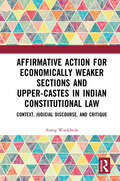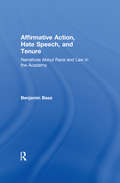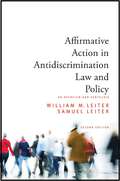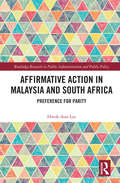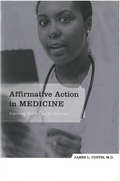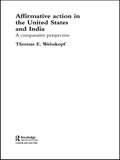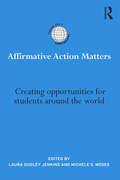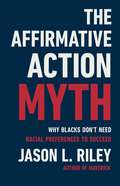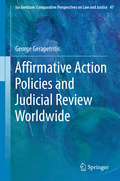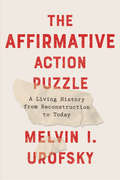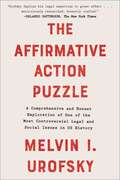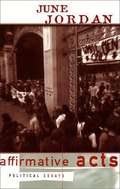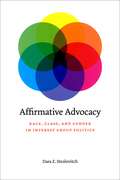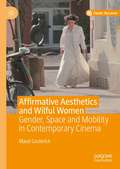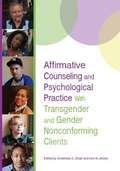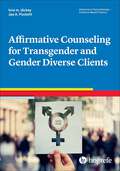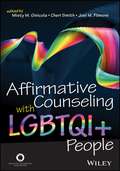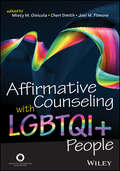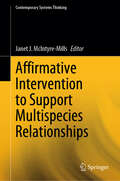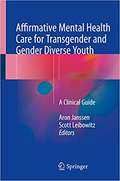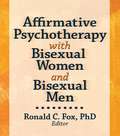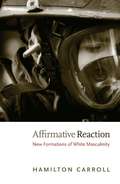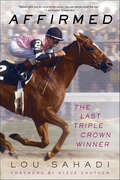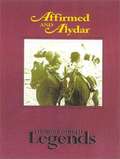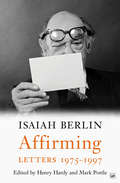- Table View
- List View
Affirmative Action for Economically Weaker Sections and Upper-Castes in Indian Constitutional Law: Context, Judicial Discourse, and Critique
by Asang WankhedeThis book examines the controversial 103rd Constitutional Amendment to the Indian Constitution that introduced an income and asset ownership-based new constitutional standard for determining backwardness marking a significant shift in the government’s social and public policy. It also analyses state level policies towards backwardness recognition of upper-caste dominant groups through case studies of Maharashtra, Haryana, and Gujarat. It provides an analytical and descriptive account of the proliferation of reservation policy in India and critiques these interventions to assess their implication on constitutional jurisprudence. Further, it assesses the theoretical and empirical challenges such developments pose to the principle of substantive equality and scope of affirmative action policies in Indian constitutional law and general discrimination law theory. The monograph shows how opening up of reservations for dominant upper-caste groups and general category will have implications for the constitutional commitment to addressing deeply entrenched marginalisation emanating from the traditional social hierarchy and the understanding of substantive equality in Indian Constitutional law. Further, it highlights key contradictions, incoherence, and internal tension in the design of the reservations for Economically Weaker Sections Critical, comprehensive, and cogently argued, this book will contribute and shape ongoing constitutional policy and judicial debates. It will be of great interest to scholars and researchers of law, Indian politics, affirmative action, social policy, and public policy.
Affirmative Action, Hate Speech, and Tenure: Narratives About Race and Law in the Academy
by Benjamin BaezUniquely positioned as both a scholar and an attorney, Benjamin Baez provides a thought-provoking exploration on the current debate surrounding race and academic institutions.
Affirmative Action in Antidiscrimination Law and Policy: An Overview and Synthesis, Second Edition
by William M. Leiter Samuel LeiterRacism, sexism, and ethnic discrimination have long represented a seemingly intractable problem. Affirmative action was conceived as an attack on these ingrained problems, but today it is widely misunderstood. This volume reviews new developments in affirmative action law, policy, and ideological conflict in the areas of employment, education, voting, and housing. The revised edition adds a discussion of age, disability, and sexual-orientation discrimination, providing a truly comprehensive portrait of affirmative action that is informed by history, law, political science, sociology, and economics.
Affirmative Action in Malaysia and South Africa: Preference for Parity (Routledge Research in Public Administration and Public Policy)
by Hwok-Aun LeeMalaysia and South Africa implement the most extensive affirmative action programmes worldwide. This book explores why and how to effect preferential treatment which has been utilized in the pursuit of inter-ethnic parity, specifically in higher education, high-level occupations, enterprise development and wealth ownership. Through methodical and critical analyses of data on education, workforce and population, the book evaluates the primary objectives of increasing majority representation in education, employment, enterprise and ownership. The book also critically considers questions of the attainments and limitations of ethnic preferential treatment in reducing disparity, the challenges of developing capability and reducing dependency and the scope for policy reforms.
Affirmative Action in Medicine: Improving Health Care for Everyone
by James L. CurtisAffirmative action programs have significantly changed American medicine for the better, not only in medical school admissions and access to postgraduate training but also in bringing a higher quality of health care to all people. James L. Curtis approaches this important transition from historical, statistical, and personal perspectives. He tells how over the course of his medical education and career as a psychiatrist and professor--often as the first or only African American in his cohort--the status of minorities in the medical professions grew from a tiny percentage to a far more equitable representation of the American population. Advancing arguments from his earlier book, Blacks, Medical Schools, and Society, Curtis evaluates the outcomes of affirmative action efforts over the past thirty years. He describes formidable barriers to minority access to medical-education opportunities and the resulting problems faced by minority patients in receiving medical treatment. His progress report includes a review of two thousand minority students admitted to U. S. medical schools in 1969, following them through graduation and their careers, comparing them with the careers of two thousand of their nonminority peers. These samples provide an important look at medical schools that, while heralding dramatic progress in physician education and training opportunity, indicates much room for further improvement. A basic hurdle continues to face African Americans and other minorities who are still confined to segregated neighborhoods and inferior school systems that stifle full scholastic development. Curtis urges us as a nation to develop all our human resources through an expansion of affirmative action programs, thus improving health care for everyone. James L. Curtis is Clinical Professor Emeritus of Psychiatry, Columbia University College of Physicians and Surgeons.
Affirmative Action in the United States and India: A Comparative Perspective (Routledge Frontiers Of Political Economy Ser. #Vol. 56)
by Thomas E. WeisskopfArguably, two of the most important national experiences with policies of positive discrimination in favor of historically disadvantaged ethnic or caste minority groups are the cases of 'Affirmative Action' in the United States and 'Reservation Policies' in India. This essential new book examines the consequences of affirmative action in both count
Affirmative Action Matters: Creating opportunities for students around the world (International Studies in Higher Education)
by Laura Dudley Jenkins Michele S. MosesAffirmative Action Matters focuses specifically on affirmative action policies in higher education admissions, the sphere that has been the most controversial in many of the nations that have such policies. It brings together distinguished scholars from diverse nations to examine and discuss the historical, political and philosophical contexts of affirmative action and clarify policy developments to further the meaningful equality of educational opportunity. This unique volume includes both well established and emerging policies from the Americas, Europe, Africa, and Asia, policies which developed under a variety of political systems and target a range of underrepresented groups, based on race, ethnicity, gender, class, social background, or region. Accessible and thought provoking case studies of affirmative action demonstrate that such policies are expanding to different countries and target populations. While some countries, such as India, have affirmative action policies that predate those in the United States, affirmative action is a recent development in countries such as Brazil and France. Legal or political pressures to move away from explicitly race-based policies in several countries have complicated affirmative action and make this assessment of international alternatives particularly timely. New or newly modified policies target a variety of disadvantaged groups, based on geography, class, or caste, in addition to race or sex. International scholars in six countries spanning five continents offer insights into their own countries’ experiences to examine the implications of policy shifts from race toward other categories of disadvantage, to consider best practices in student admission policies, and to assess the future of affirmative action.
The Affirmative Action Myth: Why Blacks Don't Need Racial Preferences to Succeed
by Jason L RileyFrom Wall Street Journal columnist and Manhattan Institute senior fellow Jason L. Riley, a "clear, concise, and humane account" (Christina Hoff Sommers) of how racial preferences have done more harm than good for black Americans After the Supreme Court ruled in 2023 that the use of race in college admissions was unconstitutional, many predicted that the black middle class was doomed. One byproduct of a half century of affirmative action is that it has given people the impression that blacks can&’t advance without special treatment. In The Affirmative Action Myth, Jason L. Riley details the neglected history of black achievement without government intervention. Using empirical data, Riley shows how black families lifted themselves out of poverty prior to the racial preference policies of the 1960s and 1970s. Black incomes, homeownership, and educational attainment were all on the rise in the first two-thirds of the twentieth century and began to stagnate only after affirmative action became the law of the land, tainting black achievement with suspicions of unfair advantage. Countering thinkers who blame white supremacy and systemic racism for today&’s racial gaps, Riley offers a more optimistic story of black success without racial favoritism.
Affirmative Action Policies and Judicial Review Worldwide (Ius Gentium: Comparative Perspectives on Law and Justice #47)
by George GerapetritisThis book discusses affirmative action or positive discrimination, defined as measures awarding privileges to certain groups that have historically suffered discrimination or have been underrepresented in specific social sectors. The book's underlying rationale is that one cannot place at the same starting point people who have been treated differently in the past because in this way one merely perpetuates a state of difference and, in turn, social gaps are exaggerated and social cohesion is endangered. Starting out with an introduction on the meaning and typology of affirmative action policies, the book goes on to emphasise the interaction of affirmative action with traditional values of liberal state, such as equality, meritocracy, democracy, justice, liberalism and socialism. It reveals the affirmative action goals from a legal and sociological point of view, examining the remedial, cultural, societal, pedagogical and economy purposes of such action. After applying an institutional narrative of the implementation of affirmative action worldwide, the book explains the jurisprudence on the issue through syntheses and antitheses of structural and material variables, such as the institutional recognition of the policies, the domains of their implementation and their beneficiaries. The book eventually makes an analytical impact assessment following the implementation of affirmative action plans and the judicial response, especially in relation to the conventional human rights doctrine, by establishing a liaison between affirmative action and social and group rights. . The book applies a multi-disciplinary and comparative methodology in order to assess the ethical standing of affirmative action policies, the public interests involved and their effectiveness towards actual equality. In the light of the above analysis, the monograph explains the arguments considering affirmative action as a theology for substantive equality and the arguments treating this policy as anathema for liberalism. A universal discussion currently at its peak.
The Affirmative Action Puzzle: A Living History from Reconstruction to Today
by Melvin I. UrofskyA rich, multifaceted history of affirmative action from the Civil Rights Act of 1866 through today&’s tumultuous times From acclaimed legal historian, author of a biography of Louis Brandeis (&“Remarkable&” —Anthony Lewis, The New York Review of Books, &“Definitive&”—Jeffrey Rosen, The New Republic) and Dissent and the Supreme Court (&“Riveting&”—Dahlia Lithwick, The New York Times Book Review), a history of affirmative action from its beginning with the Civil Rights Act of 1866 to the first use of the term in 1935 with the enactment of the National Labor Relations Act (the Wagner Act) to 1961 and John F. Kennedy&’s Executive Order 10925, mandating that federal contractors take &“affirmative action&” to ensure that there be no discrimination by &“race, creed, color, or national origin&” down to today&’s American society. Melvin Urofsky explores affirmative action in relation to sex, gender, and education and shows that nearly every public university in the country has at one time or another instituted some form of affirmative action plan--some successful, others not. Urofsky traces the evolution of affirmative action through labor and the struggle for racial equality, writing of World War I and the exodus that began when some six million African Americans moved northward between 1910 and 1960, one of the greatest internal migrations in the country&’s history. He describes how Harry Truman, after becoming president in 1945, fought for Roosevelt&’s Fair Employment Practice Act and, surprising everyone, appointed a distinguished panel to serve as the President&’s Commission on Civil Rights, as well as appointing the first black judge on a federal appeals court in 1948 and, by executive order later that year, ordering full racial integration in the armed forces. In this important, ambitious, far-reaching book, Urofsky writes about the affirmative action cases decided by the Supreme Court: cases that either upheld or struck down particular plans that affected both governmental and private entities. We come to fully understand the societal impact of affirmative action: how and why it has helped, and inflamed, people of all walks of life; how it has evolved; and how, and why, it is still needed.
The Affirmative Action Puzzle: A Comprehensive and Honest Exploration of One of the Most Controversial Legal and Social Issues in US History
by Melvin I. UrofskyA rich, multifaceted history of affirmative action from the Civil Rights Act of 1866 through today&’s tumultuous times From an acclaimed legal historian, a history of affirmative action from its beginning with the Civil Rights Act of 1866 to the first use of the term in 1935 with the enactment of the National Labor Relations Act (the Wagner Act) to 1961 and John F. Kennedy&’s Executive Order 10925, mandating that federal contractors take &“affirmative action&” to ensure that there be no discrimination by &“race, creed, color, or national origin&” down to today&’s American society. Melvin Urofsky explores affirmative action in relation to sex, gender, and education and shows that nearly every public university in the country has at one time or another, successfully or not, instituted some form of affirmative action plan. Urofsky traces the evolution of affirmative action through labor and the struggle for racial equality, writing of World War I and the exodus that began when some six million African Americans moved northward between 1910 and 1960, one of the greatest internal migrations in the country&’s history. He describes how Harry Truman, after becoming president in 1945, fought for Roosevelt&’s Fair Employment Practice Act and, surprising everyone, appointed a distinguished panel to serve as the President&’s Commission on Civil Rights, as well as appointing the first black judge on a federal appeals court in 1948 and, by executive order later that year, ordering full racial integration in the armed forces. In this important, ambitious, far-reaching book, Urofsky writes about the affirmative action cases decided by the Supreme Court: cases that either upheld or struck down particular plans that affected both governmental and private entities. We come to fully understand the societal impact of affirmative action: how and why it has helped, and inflamed, people of all walks of life; how it has evolved; and how, and why, it is still needed.
Affirmative Acts: Political Essays
by June JordanAffirmative Acts: Political Essays marks the twenty-fifth book in the celebrated career of poet, essayist, activist, and professor June Jordan. The recipient of the Lila Wallace Reader's Digest and the PEN West Freedom to Write Awards, Jordan has created a widely influential and groundbreaking body of work over several decades. With the same clear-sighted passion found in her classic essay collections Civil Wars and Living Room, in Affirmative Acts Jordan writes brilliantly about controversial, critical, and timely issues that are currently at the center of American debate. Whether discussing the tragic dismantling of affirmative action; ruminating on the combustible intersections of race, class, gender, and injustice; reflecting on the palpable hatred that infuses American society; or speaking out against worldwide suffering, June Jordan paints, as in her previous works, what she calls "an intimate face of universal struggle."
Affirmative Advocacy: Race, Class, and Gender in Interest Group Politics
by Dara Z. StrolovitchThe United States boasts scores of organizations that offer crucial representation for groups that are marginalized in national politics, from women to racial minorities to the poor. Here, in the first systematic study of these organizations, Dara Z. Strolovitch explores the challenges and opportunities they face in the new millennium, as waning legal discrimination coincides with increasing political and economic inequalities within the populations they represent. Drawing on rich new data from a survey of 286 organizations and interviews with forty officials, Strolovitch finds that groups too often prioritize the interests of their most advantaged members: male rather than female racial minorities, for example, or affluent rather than poor women. But Strolovitch also finds that many organizations try to remedy this inequity, and she concludes by distilling their best practices into a set of principles that she calls affirmative advocacy—a form of representation that aims to overcome the entrenched but often subtle biases against people at the intersection of more than one marginalized group. Intelligently combining political theory with sophisticated empirical methods, Affirmative Advocacy will be required reading for students and scholars of American politics.
Affirmative Aesthetics and Wilful Women: Gender, Space and Mobility in Contemporary Cinema
by Maud CeuterickFifty years of feminist thought have made the idea that women stay at home while men dominate the streets seem outdated; nevertheless, Ceuterick argues that theoretical considerations of gender, space, and power in film theory remain limited by binary models. Looking instead to more fluid models of spatial relations inspired by Sara Ahmed, Rosi Braidotti, and Doreen Massey, this book discovers wilful, affirmative, and imaginative activations of gender on screen. Through close, micro-analysis of historic European Messidor (Alain Tanner, 1979) and contemporary world cinema: Vendredi Soir (Claire Denis, 2002), Wadjda (Haifaa Al-Mansour, 2012), and Head-On (Fatih Akin, 2004), this book identifies affirmative aesthetics: light, texture, rhythm, movement and sound, all of which that participate in a rewriting of bodies and spaces. Ultimately, Ceuterick argues, affirmative aesthetics can challenge the gender categories and power structures that have been thought to determine our habitation of cars, homes, and city streets. Wilful women drive this book forward, through their movement and stillness, imagination and desire, performance and abjection.
Affirmative Counseling and Psychological Practice with Transgender and Gender Nonconforming Clients
by Anneliese A. Singh Lore M. DickeyFewer than 30% of psychologists report familiarity with transgender and gender nonconforming (TGNC) clients' needs, which indicates a large gap in knowledge, skill, and competence in this area of practice. This volume provides mental health practitioners with theory-driven strategies for affirmative practice with TGNC clients of different ages, ethnicities, sexual orientations, and religious backgrounds.
Affirmative Counseling for Transgender and Gender Diverse Clients
by Lore M. Dickey Jae A. PuckettExpert guidance on a collaborative approach to mental health care in a group with some unique needs A how-to guide to affirmative counseling with transgender clients Presents the best evidence-based care Instructions for strategies to improve inclusivity Illustrated with case studies Printable tools for clinical use This volume provides fundamental and evidence-based information on working with transgender and gender diverse people in mental health services. The authors, who are experts in the field, outline the key qualities of affirming mental health services, as well as explore strategies for improving inclusivity and what evidence-based care with trans clients looks like. They also provide insight into current topics, such as working with youth, the harmful and ill-advised approach known as rapid onset gender dysphoria, and whether and how autism is a co-occurring diagnostic concern. Practitioners will find the printable resources provided invaluable for their clinical practice, including sample letters of support for trans clients who are seeking gender affirming medical care.
Affirmative Counseling With LGBTQI + People
by Misty M. Ginicola Cheri Smith Joel M. FilmorePossessing counseling competence in serving the lesbian, gay, bisexual, transgender, queer, ques-tioning, intersex, asexual, ally, pansexual/polysexual, and two-spirited (LGBTQQLAAP-2S, henceforth referred to as LGBTQI+) communities is important, particularly because previous research has shown that large numbers of this population seek therapy. If counselors are unprepared for work with this population, they could potentially do harm to these clients. Many counselors have not received adequate training to work with affectional orientation and gender minority clients; LGBTQI+ clients are aware of this deficit in the field and prescreen therapists for safety and competence in issues of affectional orientation and gender orientation. Although many standard counseling interventions will be appropriate for work with the LGBTQI+ population, counselors need an awareness and knowledge of this population and its cultures and subcultures that extend beyond typical client concerns.
Affirmative Counseling with LGBTQI+ People
by Misty M. Ginicola Cheri Smith Joel M. FilmoreThis current and comprehensive handbook will guide educators, students, and clinicians in developing the awareness, knowledge, and skills necessary to work effectively with LGBTQI+ populations. Twenty-five chapters written by experts in the field provide direction for working with clients in an authentic, ethical, and affirmative manner that is tailored to their individual strengths, needs, and identity. The book is divided into four sections, which explore the science behind gender and affectional orientation; developmental issues across the life span and treatment issues; the specialized needs of nine distinct populations; and the intersectionality of ethnicity and overlapping identities, the role of religion, and counselor advocacy. To further a deeper understanding of the content, each chapter contains an "Awareness of Attitudes and Beliefs Self-Check," a case narrative relating to the material covered, questions for discussion, and a list of online resources. The book concludes with an extensive glossary of terms, both preferred and problematic, which counselors working with these communities should understand and use appropriately. *Requests for digital versions from the ACA can be found on wiley.com. *To request print copies, please visit the ACA website here. *Reproduction requests for material from books published by ACA should be directed to permissions@counseling.org
Affirmative Intervention to Support Multispecies Relationships (Contemporary Systems Thinking)
by Janet J. McIntyre-MillsThis book offers a pioneering approach to collaborative co-authorship, integrating storytelling, participatory action research, and innovative uses of technology like Zoom to bridge geographical and cultural divides. The authors emphasize authentic dialogue, using a form of metalogue to ensure all voices are heard and respected, thus avoiding ventriloquy—speaking for or over others. Their praxis revolves around performative and regenerative projects involving indigenous custodians, academics, students, and community members, aiming to address "Species Apartheid" and promote a more inclusive and sustainable future. The book's engagement model includes inner work, focusing on critical analysis and analytical meditation on values and their consequences; outer work, involving transformative education and organic food production workshops to engage a broad community of practice; and future work, exploring narrative and "if-then" scenarios to envision new possibilities, with an emphasis on creativity and courage. The authors draw inspiration from diverse sources, including Indigenous knowledge systems and various academic institutes and organizations. Through their collaborative efforts, they aim to create a more inclusive, sustainable, and just world.
Affirmative Mental Health Care for Transgender and Gender Diverse Youth: A Clinical Guide
by Aron Janssen Scott LeibowitzSimulates a range of complexity in the clinical cases to mirror real life examples.<P><P> Discusses the potential associations between gender identity and gender expression and co-occurring psychiatric conditions and how to tease them apart.<P> Written by experts in the field.<P>This unique resource offers an in-depth, comprehensive look at different types of mental health needs of transgender and gender diverse youth, how these intersect with gender identity, gender expression, and sexual orientation, and provides practical information on how to ethically, responsibly, and sensitively care for these patients.<P> Affirmative Mental Health Care for Transgender and Gender Diverse Youth: A Clinical Guide begins with three introductory chapters which contain practical information regarding assessment, psychological interventions, and the potential medical and surgical interventions that are indicated for youth with gender identity concerns. The remaining chapters are illustrated by multiple cases build around overarching chapter themes. Each case chapter opens with broad questions applicable to clinical practices, while the cases themselves focus on a particular co-occuring mental health condition. The case chapters are structured with intersectionality in mind, including elements of ethnic, racial, and cultural diversity, and the patients range over the full developmental spectrum, from pre-pubertal children to older adolescents. Chapter cases range in complexity as well, to provide readers with the tools they need to evaluate patients, and to assist in the decision of which presenting factors to prioritize in treatment at which time. Ending each chapter are clinical take-home messages, closing with additional practical knowledge that can be applied to other cases providers may see in their own practices.<P> Written by expert clinicians in the field, Affirmative Mental Health Care for Transgender and Gender Diverse Youth: A Clinical Guide is an ideal resource not only for child and adolescent psychiatrists, but for clinicians across all mental health disciplines working with gender non-conforming youth, and who are interested in providing informed, affirmative, and intersectional care.
Affirmative Psychotherapy with Bisexual Women and Bisexual Men
by Ronald C. FoxLearn the latest practical-and bisexually affirmative-approaches to helping bisexual clientsClinical work with bisexual clients has conceptually shifted beyond the exclusive emphasis on either straight or lesbian and gay issues. There are still, however, too few psychotherapists who provide affirmative psychotherapy specific to bisexual concerns. Affirmative Psychotherapy with Bisexual Women and Bisexual Men addresses the issues of bisexuals with an accepting and affirmative perspective, providing therapists with the latest viewpoints, strategies, and research to effectively treat bisexual clients. Leading authorities with affirmative-to-bisexuals perspectives discuss problems specific to bisexuals and their lifestyles, with an eye toward providing practical, effective therapy. Unique bisexual lifestyle concerns are examined, such as transgender issues, polyamory, older bisexual women and men, and cultural differences, while providing an emphasis on cultivating well-being and a sense of community in bisexual clients.Affirmative Psychotherapy with Bisexual Women and Bisexual Men sensitively avoids the double standard long held by therapists clinically treating heterosexual or lesbian and gay individuals, showing that an affirmative viewpoint is valid and crucial for the effective treatment of bisexuals. This source clearly explains practical strategies and discusses the latest research on bisexual issues such as age, culture, heterosexual and bisexual mixed couples, and the polyamorous lifestyle with appropriate acceptance and understanding. The book also explores useful ways to develop successful health and support services specific to bisexual needs.Topics in Affirmative Psychotherapy with Bisexual Women and Bisexual Men include: affirmative psychotherapy techniques specific to bisexual women and bisexual men need for validation of bisexuality ways for clients to come to terms with their bisexuality practical value-and shortcomings-of the main therapeutic schools in providing effective psychotherapy transgender bisexuality, with illustrative case studies needs and issues of African-American bisexual clients bisexual aging issues counseling heterosexual spouses of bisexual women and men therapy approaches for clients who are bisexual and polyamorous recognizing and addressing the specific needs of different sub-groups of bisexual people and more! Affirmative Psychotherapy with Bisexual Women and Bisexual Men is a crucial addition to the literature of bisexual psychotherapy and is invaluable to counselors, psychotherapists, marriage and family therapists, social workers, psychiatrists, sex therapists, researchers, and educators in the fields of psychology, sociology, anthropology, sexuality, sex education, adolescent and adult development, and community mental health.
Affirmative Reaction: New Formations of White Masculinity
by Hamilton CarrollAffirmative Reaction explores the cultural politics of heteronormative white masculine privilege in the United States. Through close readings of texts ranging from the popular television drama 24 to the Marvel Comics miniseries The Call of Duty, and from the reality show American Chopper to the movie Million Dollar Baby, Hamilton Carroll argues that the true privilege of white masculinity--and its defining strategy--is not to be unmarked, universal, or invisible, but to be mobile and mutable. He describes how, in response to the perceived erosions of privilege produced by post-civil rights era identity politics, white masculinity has come to rely on the very discourses of difference that unsettled its claims on the universal; it has redefined itself as a marginalized identity. Throughout Affirmative Reaction, Carroll examines the kinds of difference white masculinity claims for itself as it attempts to hold onto or maintain majority privilege. Whether these are traditional sites of minority difference--such as Irishness, white trash, or domestic melodrama--or reworked sites of masculinist investment--including laboring bodies, public-sphere politics, and vigilantism--the outcome is the same: the foregrounding of white masculinity over and against women, people of color, and the non-heteronormative. By revealing the strategies through which white masculinity is produced as a formal difference, Carroll sheds new light on the ways that privilege is accrued and maintained.
Affirmed: The Last Triple Crown Winner
by Lou SahadiTelling the story that transcended the Thoroughbred racing world, Lou Sahadi's Affirmed finally gives this courageous horse his due.In 1978, racing fans witnessed the culmination of an epic rivalry when a horse named Affirmed faced off against the celebrated Alydar and emerged victorious. In this long-overdue biography of Affirmed, veteran sportswriter Lou Sahadi captures the life and spirit of this indomitable horse who twice earned Horse of the Year honors and placed #12 on the Blood-Horse list of "Top 100 Racehorses of the 20th Century."Sahadi chronicles how the initially docile chestnut colt began his stellar rise in 1977. Entering the 1978 season, many experts speculated that Alydar, the latest prize product from the storied Calumet Farm, would prove himself the better horse. Yet under trainer Laz Barrera's careful strategy and the eighteen-year-old reigning Sports Illustrated Sportsman of the Year jockey Stevie Cauthen, Affirmed bested his rival and mesmerized even the most casual of sports fans.Drawing on interviews with Cauthen, some members of the Wolfson family, and many more, Sahadi delivers fascinating subplots, including that of jockey Laffit Pincay, Jr., and owner Louis Wolfson, the Wall Street financier whose federal conviction led to the resignation of a Supreme Court justice."Sahadi tells the dramatic story of Affirmed and his young jockey . . . showing in detail how the ‘underdog' Affirmed won the Triple Crown." —New York Post ("Required Reading" pick)
Affirmed and Alydar: Racing's Greatest Rivalry (Thoroughbred Legends #15)
by Timothy T. CappsThe greatest rivalry in modern racing history began with little fanfare on June 15, 1977. The more experienced Affirmed defeated Alydar, who was making his racing debut in the Youthful Stakes at Belmont Park. In nine subsequent meetings, Affirmed got the better of Alydar six times, often by just inches. Their meetings, especially during the Triple Crown season of 1978, became the stuff of racing lore. Affirmed claimed the Triple Crown, but Alydar tested him to the limits each time in stirring stretch drives that left onlookers limp. Indeed, many racing historians consider their Belmont Stakes to be the greatest race of the 20th century. To tell one’s story is to tell the other’s, so closely intertwined are the lives of Affirmed and Alydar. Author Tim Capps, who witnessed many of the Affirmed-Alydar races, chronicles their early years, first encounters, and epic clashes. He also tells the stories of the people who raised, trained, and rode these titans. Affirmed was bred in Florida by financier Louis Wolfson, trained by the legendary Laz Barrera, and ridden by Steve Cauthen, known as “The Kid.” Alydar entered life on the historic grounds of Calumet Farm in Lexington, Kentucky, the last great horse of the old Wright regime. Trained by the young John Veitch, Alydar would have been a Triple Crown winner in any other year. As a stallion, Alydar surpassed his nemesis although Affirmed found surprising success as a sire of turf horses.
Affirming: Letters 1975-1997
by Isaiah Berlin‘IB was one of the great affirmers of our time.’ John Banville, New York Review of BooksThe title of this final volume of Isaiah Berlin’s letters is echoed by John Banville’s verdict in his review of its predecessor, Building: Letters 1960–75, which saw Berlin publish some of his most important work, and create, in Oxford’s Wolfson College, an institutional and architectural legacy. In the period covered by this new volume (1975–97) he consolidates his intellectual legacy with a series of essay collections. These generate many requests for clarification from his readers, and stimulate him to reaffirm and sometimes refine his ideas, throwing substantive new light on his thought as he grapples with human issues of enduring importance.Berlin’s comments on world affairs, especially the continuing conflict between Israel and the Palestinians, and the collapse of Communism, are characteristically acute. This is also the era of the Northern Ireland Troubles, the Iranian revolution, the rise of Solidarity in Poland, the Chernobyl nuclear disaster, the fall of the Berlin Wall, Ayatollah Khomeini’s fatwa against Salman Rushdie, the spread of Islamic fundamentalism, and wars in the Falkland Islands, the Persian Gulf and the Balkans. Berlin scrutinises the leading politicians of the day, including Reagan, Thatcher and Gorbachev, and draws illuminating sketches of public figures, notably contrasting the personas of Alexander Solzhenitsyn and Andrey Sakharov. He declines a peerage, is awarded the Agnelli Prize for ethics, campaigns against philistine architecture in London and Jerusalem, helps run the National Gallery and Covent Garden, and talks at length to his biographer. He reflects on the ideas for which he is famous – especially liberty and pluralism – and there is a generous leavening of the conversational brilliance for which he is also renowned, as he corresponds with friends about politics, the academic world, music and musicians, art and artists, and writers and their work, always displaying a Shakespearean fascination with the variety of humankind.Affirming is the crowning achievement both of Berlin’s epistolary life and of the widely acclaimed edition of his letters whose first volume appeared in 2004.
